Somewhere during a four-decade career in editing and scripting comics, Christopher Priest found himself categorised as a “black writer”, despite having written Batman, Spider-Man and other icons. He drifted away from the industry out of frustration, leaving fans of his incisive approach all the poorer. He’s back now, though, writing one of the complex villains in superhero comics.
Years ago, an editor from DC Comics got on the phone with Priest, offering the chance to work on Firestorm. A chance to escape the pigeonhole, at long last? Nope. This version of the nuclear-powered hero was a young black man. Priest told me that story the first time I interviewed him, back in 2013 for his return to Quantum & Woody, the beloved buddy-comedy superhero book he wrote for Valiant Comics in the 1990s. Comic-Con 2016 was a sort of homecoming for the pioneering creator, who’s been running as a graphics design business as his comics output dwindled to almost nothing in recent years.
It was my first in-person meeting with the 55-year-old writer, who’s weathered a ridiculous number of ups and down in comics, but will be helming a new Deathstroke title which debuts with the Deathstroke: Rebirth one-shot next week. I’ve written before about how the veteran wordsmith — who started as a 16-year-old intern at Marvel in 1978 and was promoted to editor six years later — is one of my inspirations. Given his work, I expected him to be funny but was struck by how humble and boisterous he was. In the interview that follows, Priest talks about his approach to master assassin Slade Wilson, his role in the return of Milestone Media and the impetus for a racially charged issue of the classic 1980s Power Man and Iron Fist run.
Kotaku: How’s it feel to be back at Comic-Con and seeing how huge it’s gotten?
Christopher Priest: This is really a little anxiety provoking for me because I’ve been living in a quiet town in Colorado, kind of minding my business.
I go way back with your work, back to Power Man and Iron Fist, your Black Panther run and The Crew. The minute it was announced that you were writing Deathstroke, I was super-excited, like, “He’s not writing the black guy!”
Priest: [laughs] Nobody seems to understand that. I’ve had to explain that like eight times today.
They said that in [DC Comics’ press breakfast during Comic-Con]. The idea that this is what you do or only what you can do, it’s annoying to me because it runs counter to your actual work history in the medium. You didn’t start on black guys.
Priest: [laughs]
You started with Spider-Man. You’ve written Captain America. You’ve written Batman… but, let’s actually talk about Deathstroke before I talk about meta stuff. I’ve known him ever since his introduction in Teen Titans. You’re taking him back to his roots as a villain.
Priest: Yes. Thank you for saying that. I’ve had to explain it to my editor. I went, “He’s a villain. He does nasty things.”
One of the things that’s interesting to me, especially with the way superhero villainy is portrayed now, you’ve got to have some kind of tragic flaw that puts on the brink of insanity. But Deathstroke is always presented as hyper-competent, hyper-efficient. Are you going to make him crazy?
Priest: In what way? Psychologically crazy? He’s no crazier than Batman. He is virtually the mirror image of Batman. I think that was the original intent and I’m trying to get it back to that. So we scaled him back from being Lobo with all the hardware and just being this intemperate guy who loses his temper and who speaks in a very strange sort of thug-like demeanour. This is a very intelligent guy and I’m writing him that way. I’m reading all the [older] stuff and I have researchers who went out and culled all of it together and went, “Well he uses 90 per cent of his brain.” I said, “OK, let’s stop saying that. That’s stupid.” If you could access 90 per cent of your brain, you’d be Charles Xavier. So he’s just really, really smart. He’s easily as resourceful, and dare I say ruthless, as Batman is, expect that he’s playing for the other team.
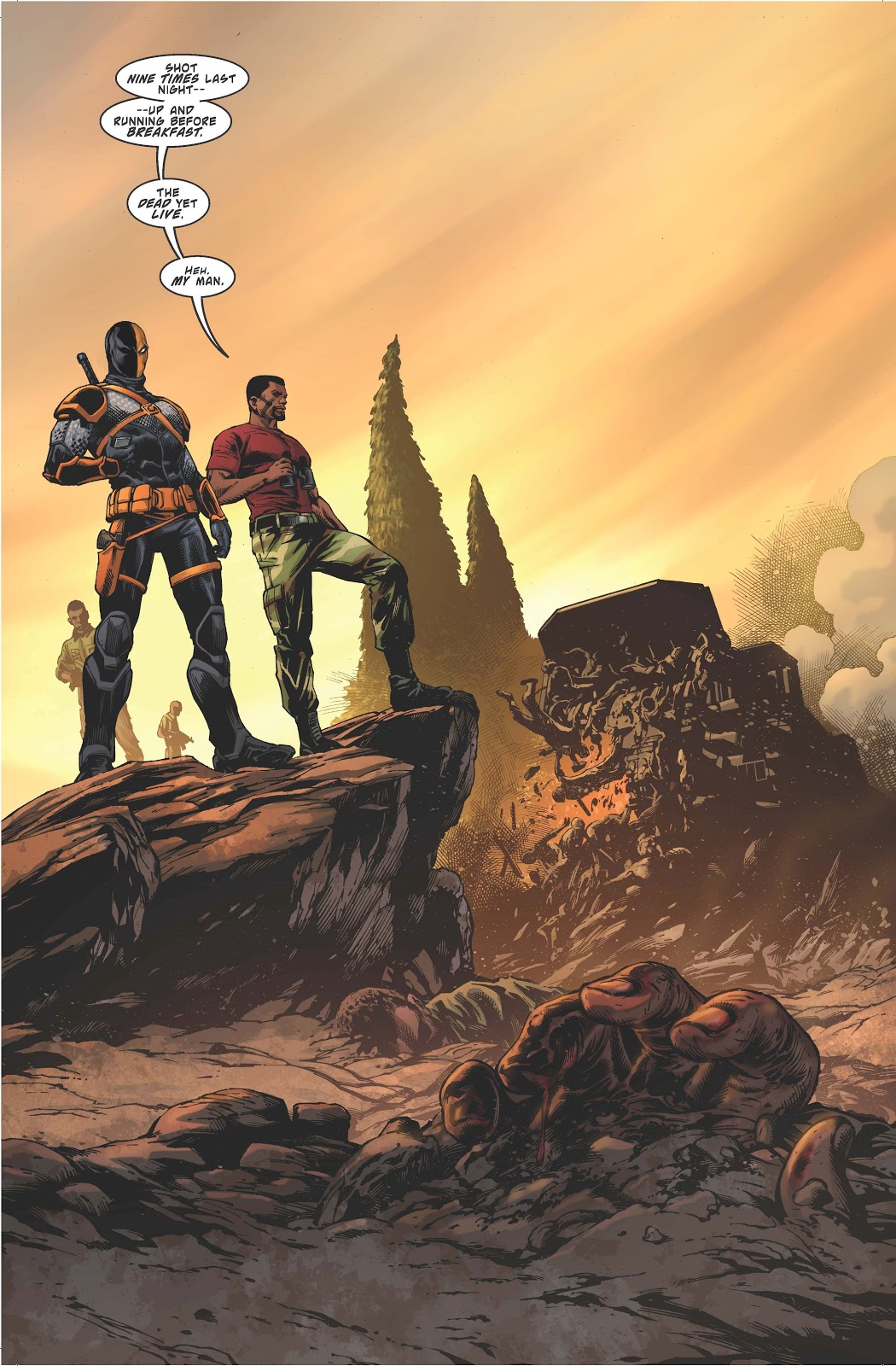
In the service of killing people for money.
Priest: Yeah. He’s not crazy at all. In some ways I think he’s saner than [Batman]. But what he is, is emotionally handicapped, and that’s what I’m having a lot of fun exploring. He’s like House, MD with a machine gun, that kind of thing. He’s the world’s greatest, most efficient assassin. But he’s the world’s worst dad ever — ever! And I’ve had to fight a little bit with DC to show him in a bad light.
In the Rebirth issue, we’re seeing a lot of flashbacks, kind of like with Quantum and Woody, where you see what their life was like as kids. Well, we don’t see Deathstroke and [confidant] Wintergreen as kids. But we see Slade’s kids as children and what an incredible dick he was to them when they were children.
There was a little resistance where it’s like, “Well you know that’s a little harsh.” I went, “He’s a villain. Hello? He’s a villain.” So I had to keep saying that over and over again down at the company because there’s a temptation to show him in a heroic light because his name is on the comic book.
You mentioned two Priest hallmarks just now. Flashbacks have been part of your storytelling style.
Priest: Yeah. A lot of that’s deliberate. Some of those cues from Quantum and Woody and from Black Panther, I did that deliberately because there’s a group of people who know who I am and they’re buying the book for that reason. And there’s a group of people who are just Deathstroke fans who will be horrified and hate me for how I tell a story.
But the other hallmark is that you write emotionally complicated, damaged characters. What was read as a humour book in Quantum and Woody was really some of the most painful personal stories I’ve read in fiction. What is it about that angle that you keep coming back to?
Priest: I think every writer is in search of the truth. We are trying to psychoanalyse ourselves. A lot of that Quantum and Woody stuff, some of those stories are true. They’re told in a humorous ways with metaphors of dragging dead dogs up flights of steps. Amy Fishbein is actually my old girlfriend Maxine, who I’m still in contact with. She was my first girlfriend. I was six years old. We’re now very much older. A lot of the dynamic between Quantum and Woody is me and [artist/frequent collaborator M.D. “Doc” Bright]. We love each other. We hate each other. In Deathstroke…
Who’s your Wintergreen then?
Priest: Now you’ve thrown me off. Hold that thought there. With Deathstroke, in the Rebirth issue, we’re seeing a story about how Slade has taken his boys camping and the boys are threatened by a bear.
That story came not from my life but from a friend of mine. It wasn’t a bear but it was a dog that was threatening his kids and he saved the kid from the dog and then he chastised the boy because he should have known better than to mess with that dog. I said to him, “It’s not my place but shouldn’t you hug your kid first and then call him stupid later?”
So Wintergreen is kind of having that conversation with Slade. This flashback happens 10 years ago; even then, there was a dynamic between Slade and Wintergreen where Wintergreen becomes his moral compass.
Wintergreen doesn’t always agree with Slade’s choices in terms of that dynamic. He has no problem in killing people if the people are a threat to the country or national security or to us or whatever, or if they are just really, really bad people. But Slade, if you write a big enough check, he’ll whack anybody and that crosses a line with Wintergreen and Wintergreen wanted to retire.
So, as for the Wintergreen question you asked, I have another friend who has a rather large ego, let’s put it that way. He’s a minster with a large ego. I know that’s unheard of. [chuckles] That never happens. A lot of times I’m his moral compass where he’s going a little off the rails and I open up the Bible and I go, “Well look, I didn’t write this, but it says here…”
This is your work manual.
Priest: “…that we’re supposed to behave in a certain way.” Anything that I write I can probably tell you where it came from because we’re all looking for truth. The way that I process and make writing work is I’m really telling true stories, I’m just putting them in a cape and putting an “S” on its chest. But under there, there is something that I can identify with emotionally, spiritually, or whatever, that has some truth to it.
One of the reasons your work has meant something to me over the years is because it has been the tiniest bit closest to my truth as an African-American man who’s into pop culture. I know you’ve struggled with the idea of being pigeonholed as just a black writer. How do you feel that people are still so thirsty for Milestone Media and its characters? People are still so thirsty for representation. Do you feel frustrated? Do you feel things are getting better? Is that why you’re jumping back in?
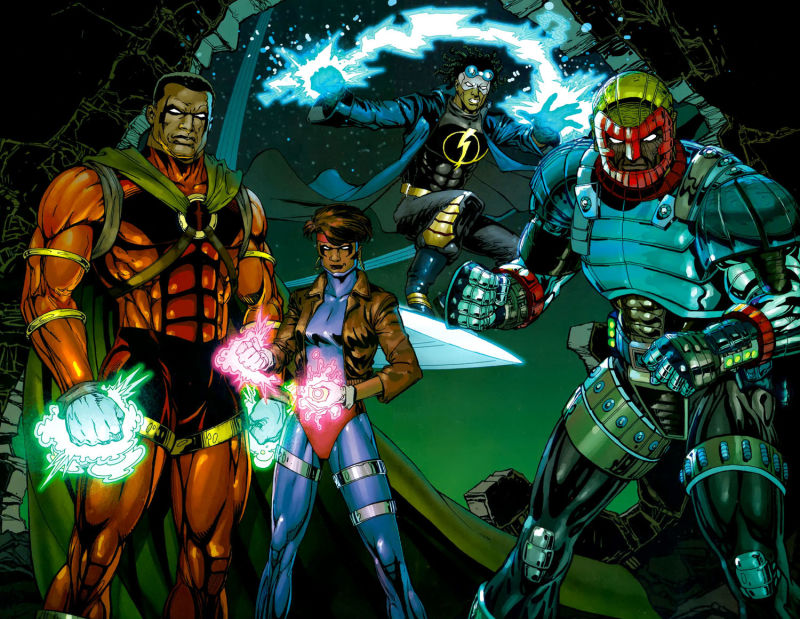
Priest: I’m not really jumping back in. I’m kind of being dragooned. I was minding my own business. But I think everybody wants to feel validated in some way and when you’re looking for leisure activities or if you’re looking for escapism or things like that, you want to read about characters you can identify with.
Now what’s happened is that the industry has become so… well it’s always been a little polarised. Where back in the ’50s you had these older white guys who came out of education or they came out of magazines or whatever like that, and the hiring practices was you kind of hired people that you liked or you hired people that you related to.
Then, in the ’70s and ’80s it became kind of cronyism where you hired your buddies. That kind of thing. Then, in 1978, Jim Shooter took a chance on a 17-year-old high school intern because he saw something in there and he kind of adopted me like a Chia Pet. But he was not replicating himself in any way. He’s an eight-foot-tall Polish guy but he became a mentor and almost a father figure for better or worse because I took on a lot of his personality.
But the industry needs to stop trying to replicate itself, and you gotta take a chance. One of the ongoing arguments that I keep having with my editor right now is, “Well I don’t understand this bit.” I said, “That’s all right. The brothers will get it. People who know my work, they’re going to get it.”
You’ve given me a good segue because I’ve talked to the producers and cast of the upcoming Luke Cage show. Have you seen any of it?
Priest: I have not, but go ahead. You may have to fill me in.
It’s a big departure from your approach to the character and other approaches. But it feels like they’re making it for, as you say, the brothers and sisters. It’s set in Harlem. The cast is like, there’s one white guy in there. It’s funny because he reminds me of one of your pet characters, Tork.
Priest: OK. Sergeant Tork.
Frank Whaley plays him. They’re taking this almost folkloric approach to the show where they’re like, “We’re going to talk about Harlem and the political machines and the connection between crime, politics and gentrification.”
Priest: Wow. That sounds great.
This is not mainstream. These are all ideas already in public discourse. But, in terms of using a superhero character to approach them, it’s pretty significant.
Priest: But it makes sense to the character. Keep going. I don’t want to interrupt you.
I mention all of that because your work went to similar places. I remember an issue of Power Man and Iron Fist, #123, where there was a riot in after a supposedly white soldier who was experimented on with super-soldier serum kills a black family. He went on a rampage. People in the streets are calling Cage out for not taking him down, saying, “You’re not black enough.” He goes and busts the guy, with the Falcon and [too-cool police sergeant] Tyrone King.
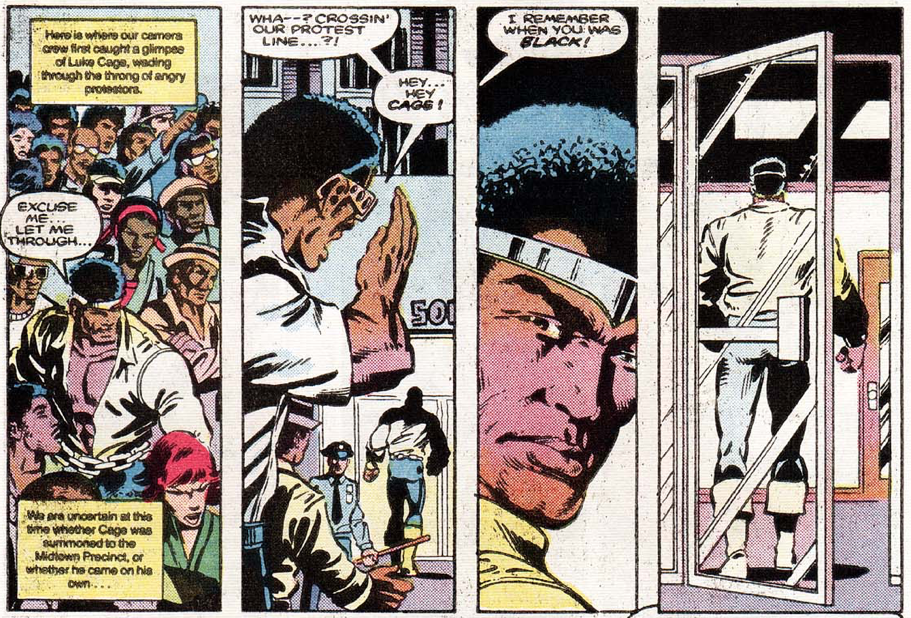
Priest: Oh right. Right, right.
Knocks the guy out. He stops being a big, glowing, giant mutant thing and he’s a black guy. And they’re like, “Well, damn.”
Priest: [laughs] That came out of, there were complaints going around the office that my Luke Cage wasn’t black enough. That was kind of a response to that where I felt, “This is very silly.” I was at Marvel once where I called my friend John. Now John lives in the projects. But me and John did music together; he plays keyboards, and I played bass or sax at the time. So we were going to hook up.
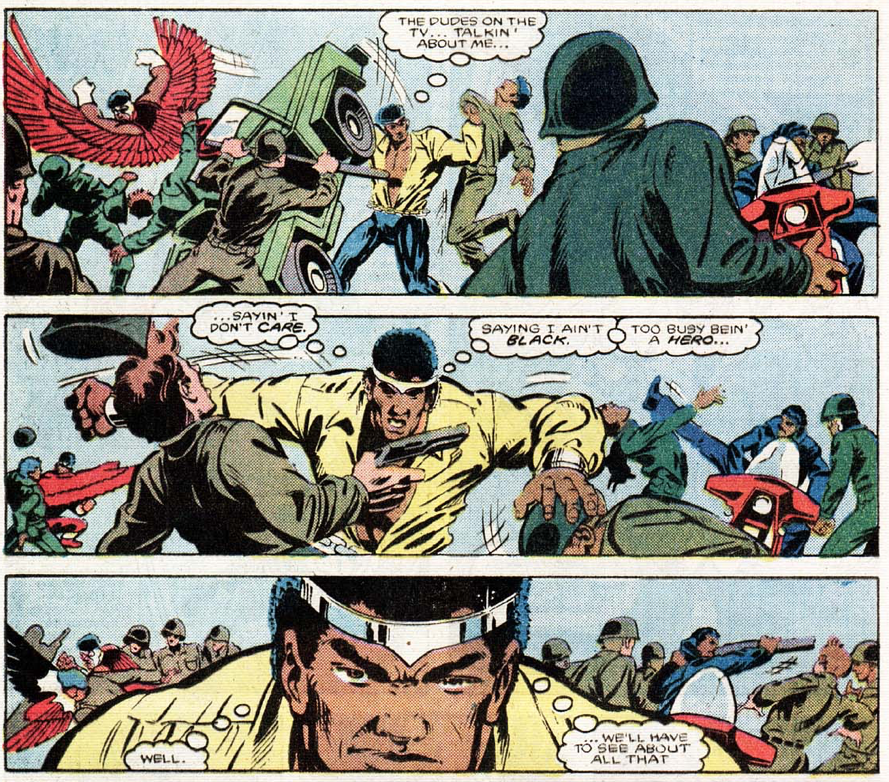
I’m talking to him on the phone and I’m like, “Yeah man, we’ll hook up after the job. I’ll be around the way or whatever.” But I’m kind of using that vernacular. I hang up the phone and the staff were standing behind me going, “We didn’t know you can talk like that.” I go, “You’re talking in a specific language in a specific place. So am I. I just go to some different spaces than you do.” Being able to articulate the human language is a job skill, particularly for us in different contexts.
I have to ask about Milestone Media, which was announced as coming back last year.
Priest: Yes. I’m meeting with the guys on Sunday.
Who are the guys?
Priest: Oh. Reginald and Denys.
As a Milestone fan, I want the back catalogue readily available. I know that is something you guys have said will happen. But I think the bigger concern is growing new talent, like Milestone originally did with John Rozum, J.H. Williams, John Paul Leon, ChrisCross. What kind of processes are you guys implementing to try and bring up the next generation? Because if we still continue to feel under-represented it 25 years later, how do you guys feel like you can personally tackle that?
Priest: I don’t know. What I’m doing with Milestone is I’m kind of playing a Geoff Johns [creative executive] role. I’m not specifically writing a comic book. I am doing some writing that I can’t announce yet because you got creative and you got business. The creative is solid. We’re good. Jim Lee, Reginald Hudlin, Denys Cowan… we all love each other. It’s this pesky business stuff that I have no idea what that is or what’s going on with that.
But what I understand is Reginald probably has a closet full of submissions in. People who are trying to work with us and things like that, that are going on. He’s very interested in new talent and that’s basically the impetus that brings him into this.
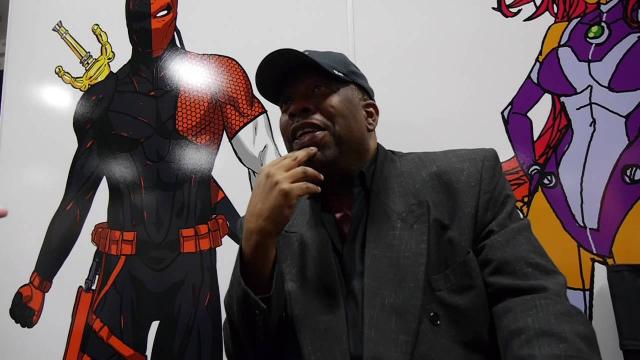
Comments
One response to “The First Black Writer At Marvel And DC Comes Back To Comics After An 11-Year Absence”
Great article, thoroughly enjoyed reading it and very enlightening. Really look forward to reading his works!